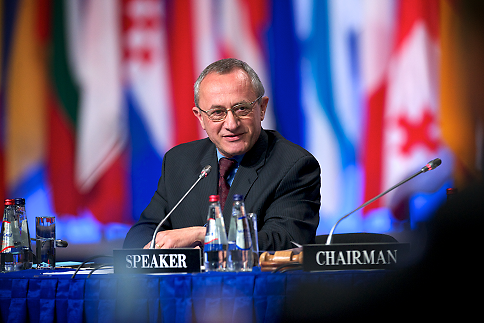"The statements of two world leaders, Vladimir Putin and Donald Trump, led the Bulletin of the Atomic Scientists to move their famed “doomsday clock” closer to Midnight. But is the threat any worse than in the bad old days of the Cold War?” -Jack Segal, former National Security Council director for non-proliferation.
On Monday, February 20, Mr. Segal discusses, “Nuclear Proliferation: New Worries?” as part of the World Affairs Council of Western Michigan’s Great Decisions Global Discussions.
He explains how he and others managed this risk for decades to keep nuclear weapons under control. He also will give his frank assessment as to whether the recent political rhetoric upsets 75 years of nuclear stability.
Segal is a retired senior Foreign Service Officer who has worked on nuclear issues throughout a 35-year career. He was State Department representative to the Strategic Arms Reduction Talks (START) under President Reagan, during which he authored the landmark “Agreement on Nuclear Risk Reduction” reached with the USSR in 1987.
He went on to an assignment in Moscow, where he worked with Russian counterparts to implement nuclear and chemical weapons agreements, then he and his wife Karen opened the first U.S. Consulate General in central Russia. From that vantage point he supervised the monitoring of the Intermediate-range Nuclear Forces (INF) agreement and continued his work on a chemical weapons destruction agreement.
Returning to Washington, Segal became chief of staff to the State Department’s Under Secretary for Arms Control and International Security where he managed a staff that was dealing with major challenges from Iran, North Korea and Pakistan. He then went to President Clinton’s National Security Council as director for Russia, Ukraine and Eurasia, then to a second posting as NSC director for non-proliferation where he again dealt with issues that still remain major challenges today.
Great Decisions highlights the most critical global topics each year as chosen by the Foreign Policy Association in New York City. The World Affairs Council brings experts to West Michigan to discuss all eight topics, presenting Monday evenings at the Aquinas College Performing Arts Center. The series runs through April 3, with additional topics including U.S. China-relations; U.S. jobs and trade; updates on Afghanistan and more. Full details on the series are available at worldmichigan.org.
The Council is dedicated to educating people in western Michigan about other countries and cultures of the world, as well as providing a forum for discussion of critical foreign policy issues. In existence since 1949, the World Affairs Council of Western Michigan is a non-partisan, non-advocacy educational non-profit organization. With 60 member companies and almost 3,000 members, it is considered one of the best Councils in the national network of 100 World Affairs Councils.
The Rapidian, a program of the 501(c)3 nonprofit Community Media Center, relies on the community’s support to help cover the cost of training reporters and publishing content.
We need your help.
If each of our readers and content creators who values this community platform help support its creation and maintenance, The Rapidian can continue to educate and facilitate a conversation around issues for years to come.
Please support The Rapidian and make a contribution today.
